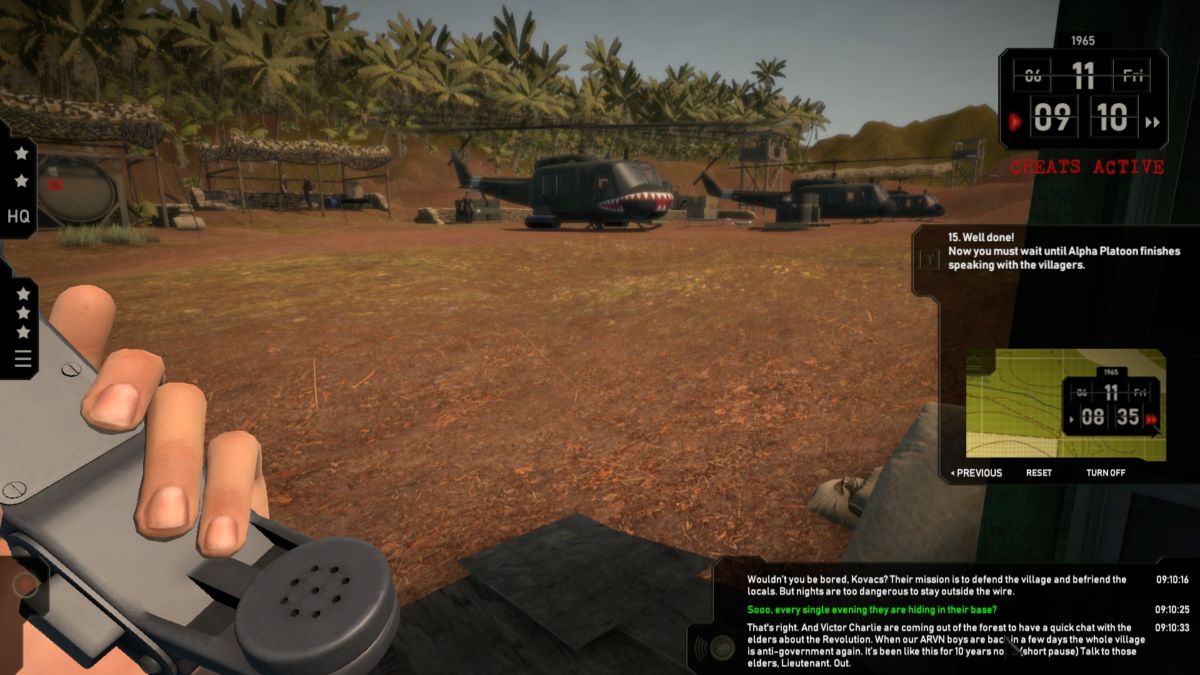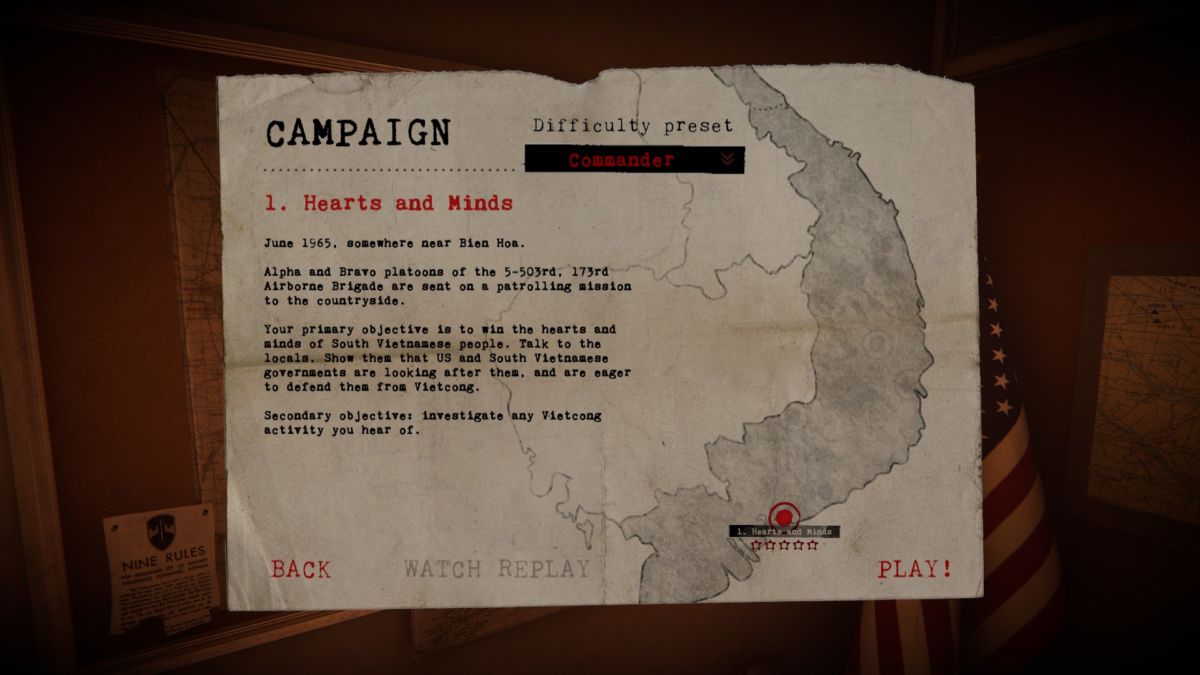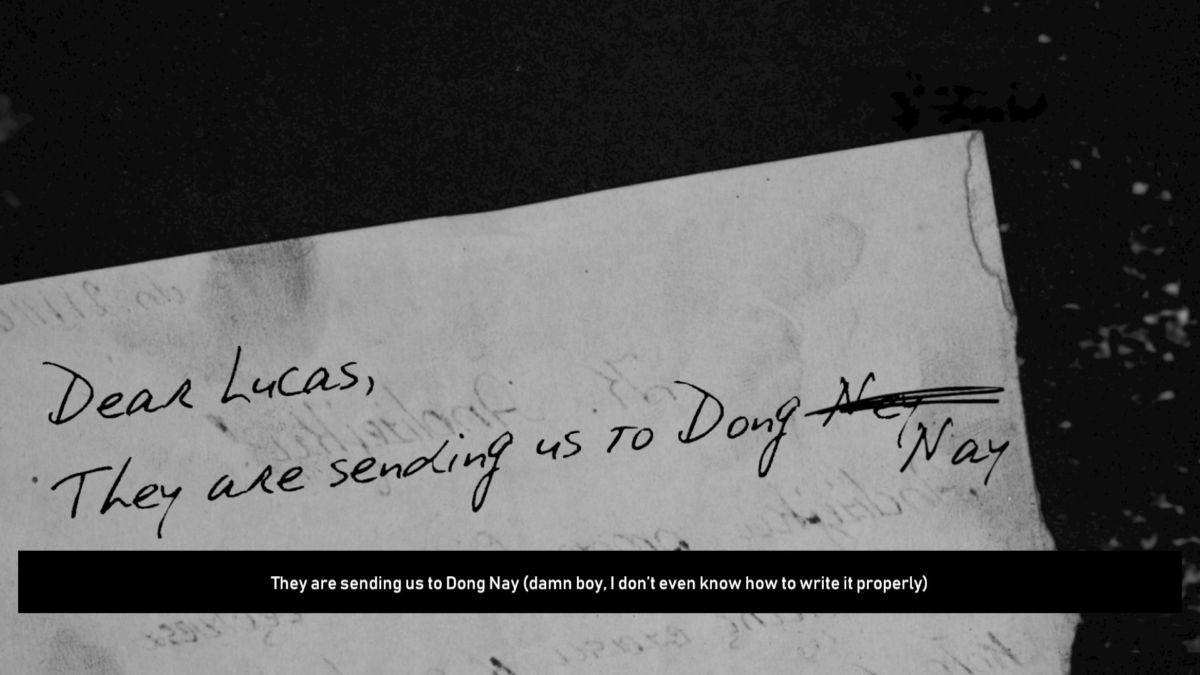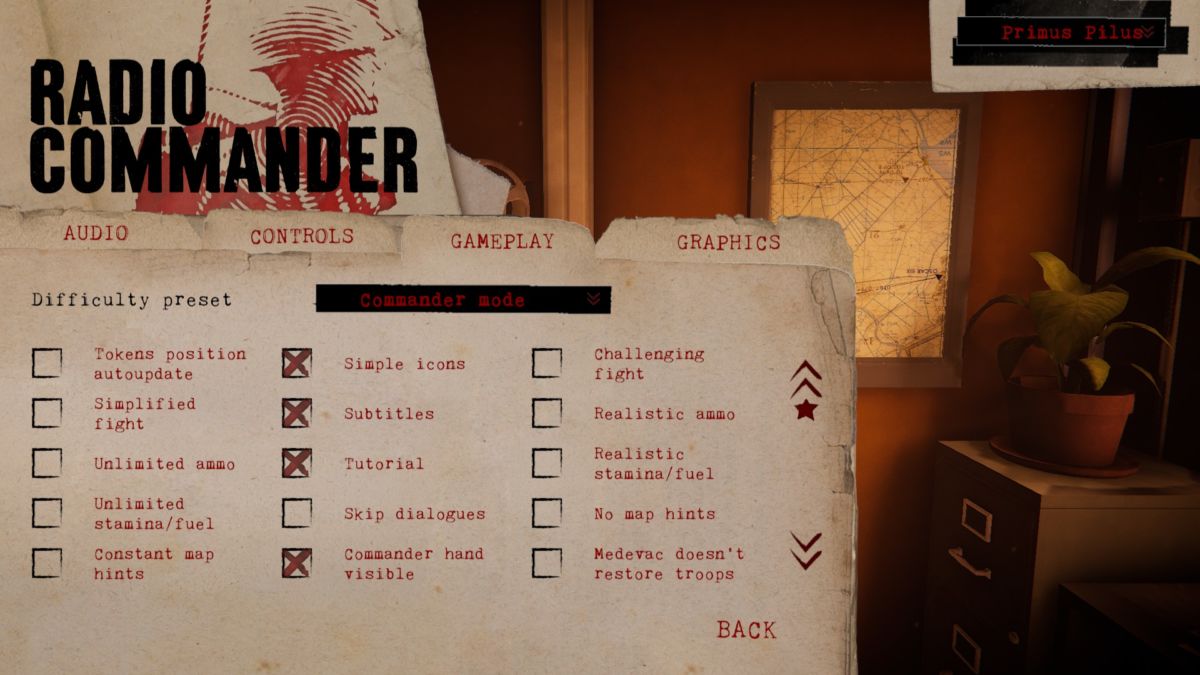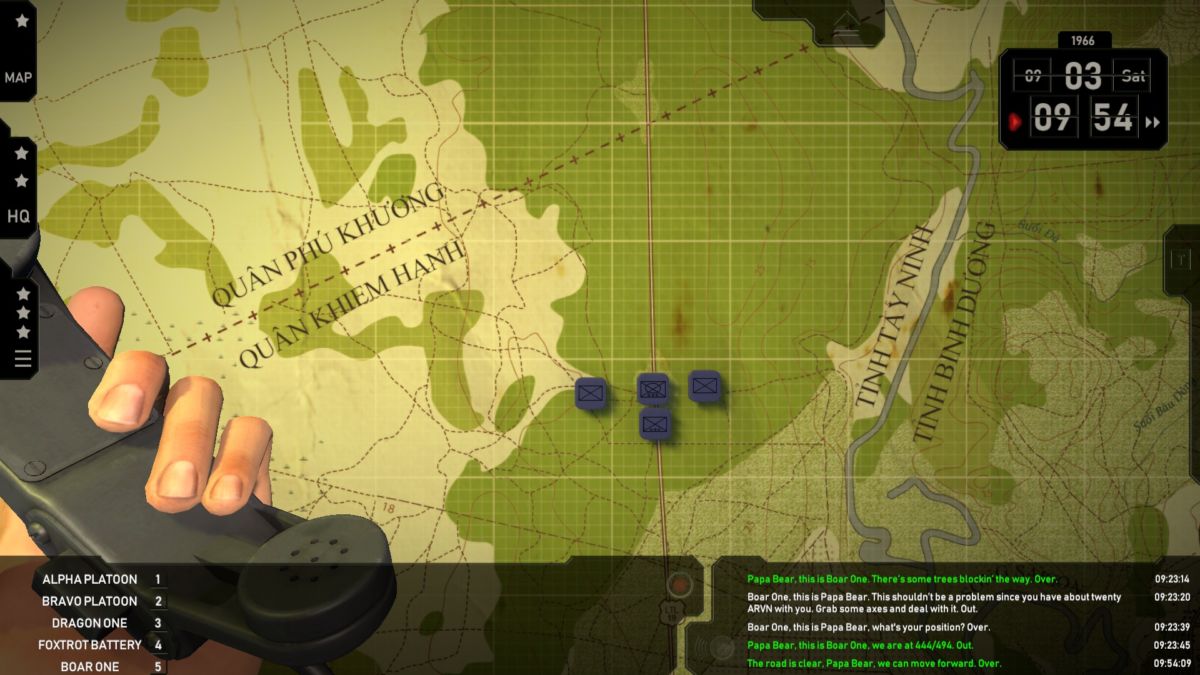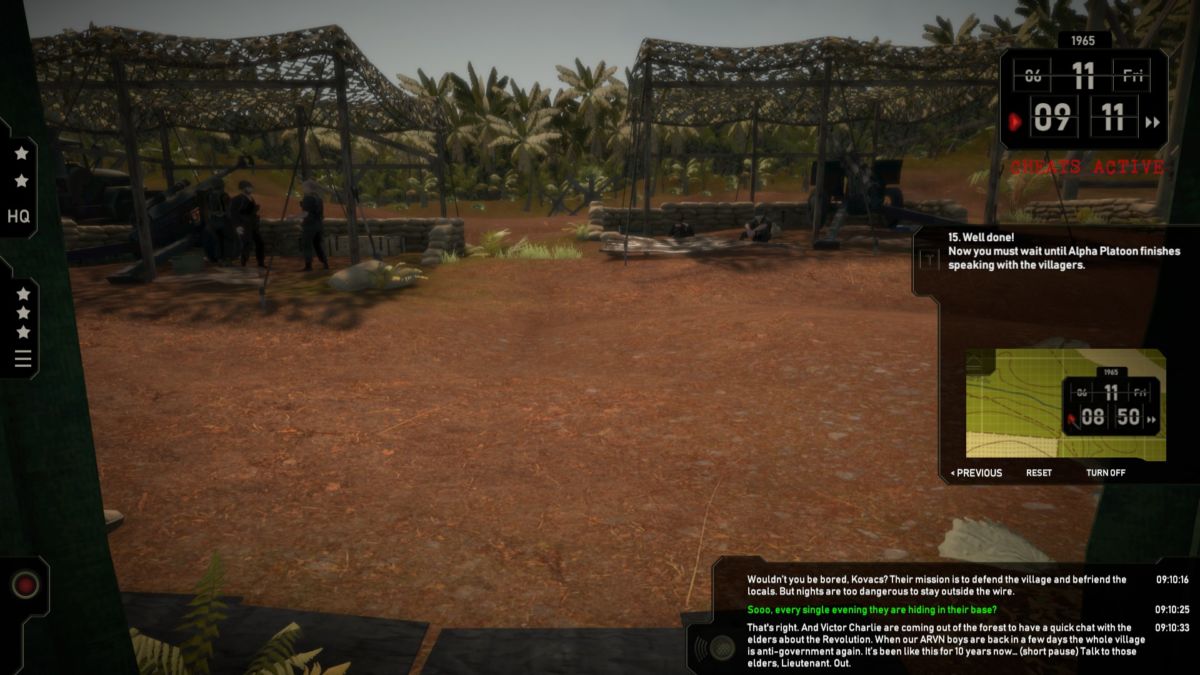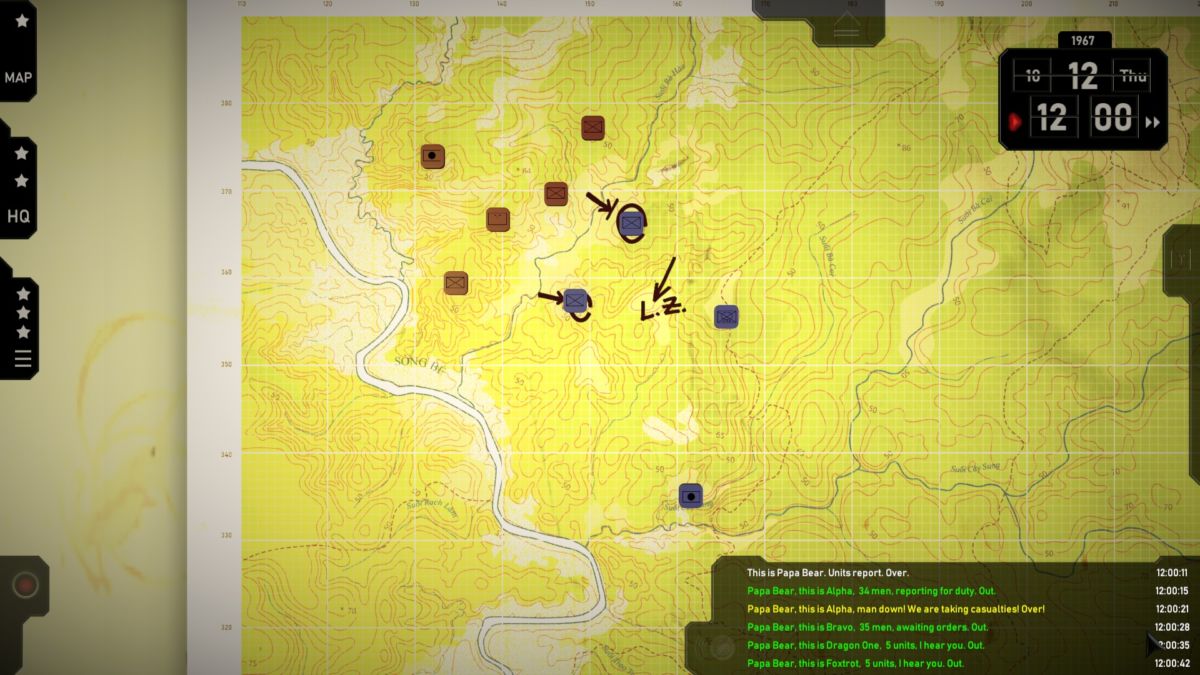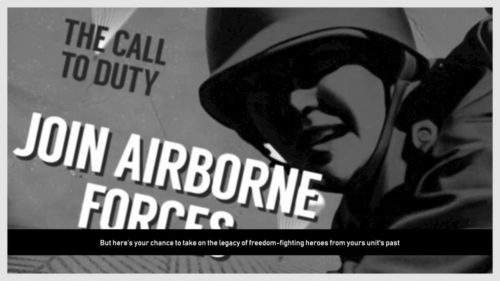
Have you ever wondered what it would be like to command forces using only a radio? Radio Commander offers just that, as it as it sheds light on an often overlooked element of war – the perspective of a desk-bound commander, leading the war effort with imperfect information through a faulty radio. Along with showing a unique approach to war, the developers use this platform to mesh two genres together: role-playing and real-time strategy.
Radio Commander is set during the Vietnam War just before the conflict goes into full swing. Players take the role of an unnamed radio operator and leader in a base somewhere in the countryside, commanding units through a radio. Though the rank of the player character is not mentioned, it seems by their desk and map bound job that they are a lieutenant colonel or higher rank.
The game has three distinct modes: custom battles, quick battles, and the primary mode, the story campaign. It is broken up over nine missions, each with its own conditions and objectives following a loose narrative led by fully-voiced characters. Throughout these missions, the player can have a minor effect on the narrative with some dialogue options with their characters. Before every mission players will view cutscenes that are a mixture of letter exchanges and short films in the spirit of contemporaneous propaganda. These establish the theme and characters.
The developers do not shy away from harsh, vulgar or racist dialogue and language in an effort to portray the setting realistically. Radio Commander’s greatest strength is its ability to create the experience and atmosphere of war highlighting the positives and negatives of the Vietnam War, especially from the eyes of a desk-bound commander. Even with relatively simple graphics and sparing audio cues, it is remarkable what they have been able to do to bring the world to life.
Custom battles allow players to create their own scenarios or import community-created ones to play through. Quick battles let the player engage in randomly-generated missions based on a variety of parameters. Where the story campaign focuses more on the role-playing experience, character development and general atmosphere, custom and quick battles are oriented around the strategic decision-making of the game.
During missions, players will be using a radio to communicate with their troops while relying on the map to track movements and positions. Troop types available to the player include units like infantry, APCs, artillery, helicopters, aircraft, and supply vehicles. It is very much up to the player to use all their tools to create as clear a picture of the tactical situation.
Integral to the game experience are the difficulty options, of which there are four presets. Story mode makes the game easier to play by simplifying combat. Commander mode, equivalent to normal, enables options that increase some combat realism and tries to balance progressing through the game smoothly with intense combat. Veteran mode is, more accurately, hardcore mode, turning on all options that would maximize realism, such as making radios unreliable, troops getting lost, and taking away some quality of life improvements for a more realistic experience. Custom mode allows players to pick and choose which options to enable to customize their experience.
Since Radio Commander is not a graphically taxing game, there are minimal graphics options and simple audio sliders for the various types of audio. The game ran smoothly with little or no framerate drops. I only encountered a single annoying bug back while saving mission number three and then was unable to load back in, preventing me from redoing the mission altogether. Otherwise, there were no game-breaking bug nor were there any crashes.
Radio Commander has, unfortunately, been mismarketed as a strategy-focused experience, with a fresh, innovative and unique take on the real-time strategy genre. This seems to be a misnomer as a better way to view Radio Commander is to treat it as a role-playing crisis management game with elements of real-time strategy. This way, it’s easier to understand what the game was going for and where some of its main issues lie.
As a role-playing experience, Radio Commander is solid. The focus, thought and care put into the voice acting, dialogue and the theme is top notch. Radio Commander and its developers should also be commended for trying something new here by showing a unique point-of-view on the war experience.
And perspective is exactly where the main issue lies for the game if we are treating it as a strategy game. For strategy games, this is important to guide the player in recognizing the scale of the game and its objectives. This helps them adapt to the control scheme and to the decision-making approach necessary to complete the game’s objectives.
As said previously, the point-of-view of the player in Radio Commander is that of a desk-bound leader, someone with great responsibility to oversee strategic operations, regardless of whether they are lieutenant colonel or some other rank. This viewpoint inherently requires a matching scale and game mechanics allowing the player to grasp the scale of the game and use their character’s context to inform their decision-making. In Radio Commander, the player will find themselves babysitting and microing small tactical units to a frustratingly absurd degree, such as continuously monitoring unit positions or telling helicopters to unload cargo once they arrive, then load new cargo, then go back to base. The only thing that does not require the player’s supervision is for squads to retaliate once attacked. To truly simulate real command, this game needs a kind of delegation system or simple AI for the tactical combat units to act independently without guidance from the player.
The central mechanic of the game, which is the use of the radio for every action and order, is great for a simulated role-playing experience as it helps the player take on a very particular mindset. For an effective strategy game, however, this central radio mechanic becomes repetitive and frustrating, only serving to pad the experience. The tactical decision-making in Radio Commander can be boiled down to setting waypoints for units and waiting for them to complete movement, with frequent microing or double-checking of positioning. Moreover, there is no easy way to skip dialogue, which means the player will be forced to sit through and listen to every piece of dialogue. This only adds to the tedium and frustration.
Comparing the treatment of perspective in Radio Commander to Steel Division 2, in the latter, the game’s scale as well as command and control mechanics all aid the player in performing effective decision-making. Arguably, the character point-of-view of the player in both games is similar, but the manner in which they act upon the field and the goals of the games themselves is more successful in Steel Division 2. Radio Commander’s issues primarily come from a core problem in the game design.
The game tries to drive a fine balancing act between role-playing and strategy and unfortunately, these genres, though not inherently in opposition, clash. The design features from either of these genres do not support each other, but, in effect, create a sense of conflict in the game’s identity. You will find yourself frustrated and asking if it is right to be frustrated because of the peculiarities of the radio operator mindset, in which case the game is successful at illustrating the mindset of someone in that role. But being frustrated because of the mechanics of the game does not make the experience fun and provides only a superficial challenge to achieving strategic and tactical objectives. In this case the game fails at its fundamental role of providing a fun experience.
To commend Radio Commander, its presence alone has raised many questions on game design. Can simulation-style experiences be marketable to a wide audience or only a niche audience? Are some perspectives too difficult to translate into a meaningful game experience? What should the focus of the game design be: a model of reality with everything that comes with it, such as tedium, periods of inaction, and frustration at the unknown, or a fun, interactive, and enlightening experience, which takes the player’s enjoyment as the priority? The fact that Radio Commander even raises these questions just shows how difficult it is to compose and develop games, especially those that are ambitious and try new mechanics. While I cannot recommend Radio Commander, I can praise it for its concepts and effort in taking a new approach in portraying the military experience.
Some of the coverage you find on Cultured Vultures contains affiliate links, which provide us with small commissions based on purchases made from visiting our site. We cover gaming news, movie reviews, wrestling and much more.



